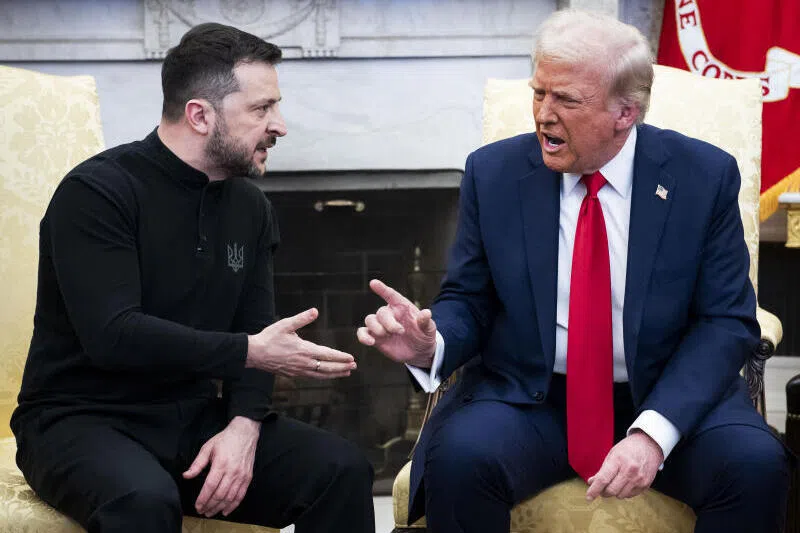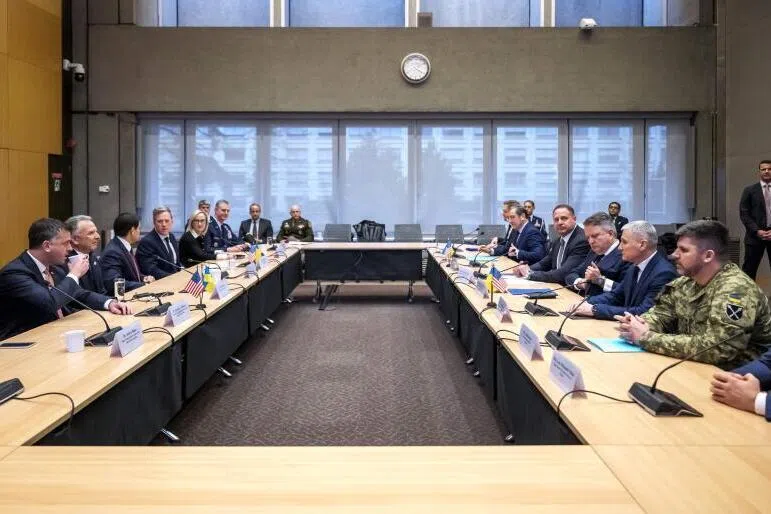Zelensky thanks Trump as US leader blasts Ukraine for ‘zero gratitude’ amid talks to end war
Sign up now: Get ST's newsletters delivered to your inbox

US President Donald Trump berates Ukrainian President Volodymyr Zelensky at the White House in Washington, on Feb 28.
PHOTO: DOUG MILLS/NYTIMES
WASHINGTON – Ukrainian President Volodymyr Zelensky sought to win back Donald Trump’s favour on Nov 23, after the US leader blasted at Kyiv amidst crucial talks in Geneva to end the war with Russia.
The US President, who is known for blowing hot and cold on Ukraine, earlier said on his Truth Social platform that Ukraine’s leadership “EXPRESSED ZERO GRATITUDE FOR OUR EFFORTS,” referring to his plan to end the nearly four-year conflict, which adhered to some of Moscow’s demands.
A few hours later, Mr Zelensky wrote on X: “Ukraine is grateful to the United States, to every American heart, and personally to President Trump for the assistance that – starting with the Javelins – has been saving Ukrainian lives.”
In Geneva, US and Ukrainian top officials were busy making changes to the 28-point draft plan
“The current version of the document, although still in the final stages of approval, already reflects most of Ukraine’s key priorities,” negotiator Rustem Umerov, who is also the secretary of Ukraine’s security council, said.
The initial US blueprint heeded to some of Moscow’s hardline demands, requiring the invaded country to cede territory, cut its army and pledge never to join Nato. It did also provide for some vague security guarantees and the use of frozen Russian assets to rebuild the war-torn Ukraine.
Mr Trump had given Ukraine until Nov 27 to approve the plan, but Kyiv wants changes to a draft that accepts a range of Russia’s hardline demands, including requiring the invaded country to cede territory, cut its army and pledge never to join Nato.
German Chancellor Friedrich Merz on Nov 23 said he was “sceptical” a deal could be reached by that deadline.
The US president told reporters on Nov 22 the proposal was not his final offer and he hoped to stop the fighting “one way or the other”, raising hopes that it would be possible to strengthen Kyiv’s position.
‘Ukrainian perspectives’ included
A US official, who asked not to be named, told AFP that a number of meetings were held throughout the day on Nov 23, with the US and Ukrainian delegation holding “detailed discussions about the peace agreement”.
“It was productive and even conclusive in some areas,” the official said, adding that a second round of talks underway at the US mission in Geneva aimed at “ironing out the details of the agreement”.
By late Nov 23 afternoon, Ukrainian negotiator Rustem Umerov said the latest version of the US draft plan, which AFP has not seen, “already reflects most of Ukraine’s key priorities”.
Ukrainian President Volodymyr Zelensky also said on social media that the “American proposals may include a number of elements based on Ukrainian perspectives and critical for Ukrainian national interests”, hailing that “diplomacy has been reinvigorated”.
Recognise European ‘centrality’
The US plan was drafted without input from Ukraine’s European allies, who were striving on Nov 23 to make their voices heard and boost Kyiv’s position.
“Ukraine must have the freedom and sovereign right to choose its own destiny. They have chosen a European destiny,” EU chief Ursula von der Leyen said in a statement, stressing that the “centrality” of the European Union’s role must be “fully reflected” in any peace plan.
Ukraine’s European allies gathered at the G20 summit in South Africa stressed that the US plan requires “additional work”.

US delegation, including Secretary of State Marco Rubio (third from left) and special envoy Steve Witkoff (second from left), face Ukrainian delegation, headed by presidential advisor Andriy Yermak (fourth from right), at the closed-doors talks in Geneva.
PHOTO: AFP
Finnish President Alexander Stubb told AFP that he and Italian leader Giorgia Meloni had called Mr Trump early Nov 23 to discuss his Ukraine proposal.
“Of course, we discussed the situation, the 28-point plan, and some of the developments here in Johannesburg related to the peace plan,” he said, declining to reveal the content of the discussions.
French President Emmanuel Macron told a news conference at the G20 that the plan contained points that had to be more broadly discussed as they concerned European allies, such as Ukraine’s Nato ties and Russian frozen assets held in the EU.
He said the 30 countries in the “coalition of the willing” supporting Kyiv will hold a video call on Nov 25 following the Geneva talks.
European Union countries were also planning to meet to discuss the Ukraine situation on the sidelines of a meeting with African leaders in Angola on Nov 24.
‘Wish list’
Questions were meanwhile being raised over how much input Moscow may have had in drafting the original proposal, which was welcomed by the Kremlin.
Russian President Vladimir Putin has said the blueprint could “lay the foundation” for a final peace settlement, but threatened more land seizures if Ukraine walked away from negotiations.
Ahead of Nov 23’s talks, Washington insisted the Trump proposal was official US policy, denying claims by a group of US senators that Mr Rubio told them the document was a Russian “wish list”
Mr Rubio himself insisted on social media late Nov 22 that “the peace proposal was authored by the US”.
“It is offered as a strong framework for ongoing negotiations. It is based on input from the Russian side. But it is also based on previous and ongoing input from Ukraine.”
That did not calm all concerns.
“Together with the leaders of Europe, Canada and Japan, we have declared our readiness to work on the 28-point plan despite some reservations,” Polish Prime Minister Donald Tusk said on X on Nov 23.
“However, before we start our work, it would be good to know for sure who is the author of the plan and where was it created.” AFP


